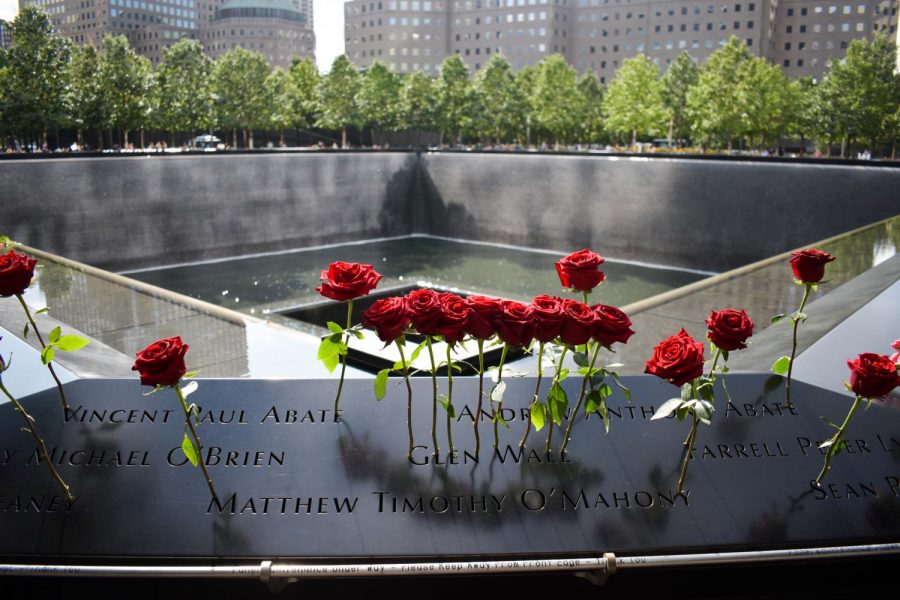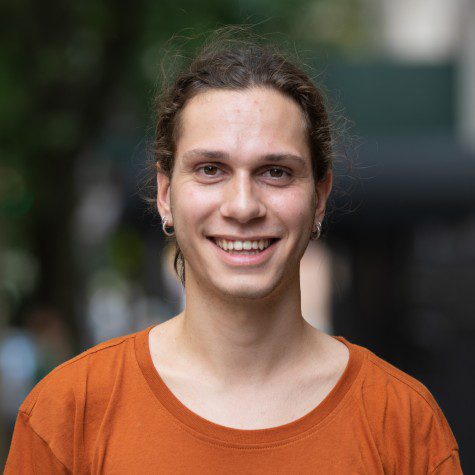During a national tragedy — a pandemic that at press time has killed at least 192,000 Americans — hundreds gathered around a twin-fountain memorial to remember, grieve and mourn another national tragedy — 9/11. Many took photos; others wept. Family members of the 2,977 victims of the terror attack fitted flowers into the victims’ names, which are etched into the fountains’ metal railings. Port Authority police officers, armed with what appeared to be M4 carbine rifles, stood guard.
Although the tourists, visitors, mourners and bereaved stood cheek to cheek around the 9/11 Memorial, Bill Mitchell, a firefighter in the FDNY, told WSN that the memorial was less crowded than usual, adding that an official memorial service — at which the FDNY’s band normally plays — had been cancelled due to COVID-19. Besides those things, however, he found that the pandemic had left the somber day largely untouched. Some said the same.
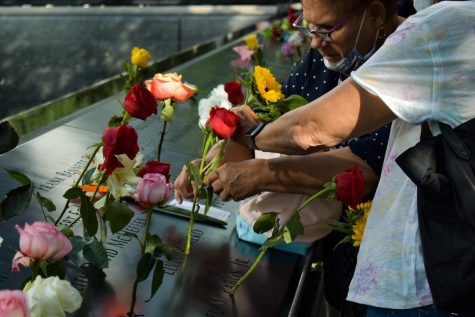
Jake McIlraith, 27, went all the way from Jersey City, NJ, along with a companion to the Lower Manhattan memorial to pay his respects.
“My dad was working across the street when it happened, and he knew some people,” McIlraith told WSN. “We live close enough to come pay our respects and we were off, so we decided it was the right thing to do.”
“We heard they were cancelling the gathering, but you look around there’s still — for hours — been a steady flow of people,” McIlraith continued. “People are still out here, regardless of COVID. I don’t think it really slowed it down besides the big TV production … We thought there was gonna be more restrictions. Honestly, I walked right up and walked right in here and I’m right in front. I know it’s been more crowded in the past, so if anything, it’s easier for the people who still wanted to come out.”
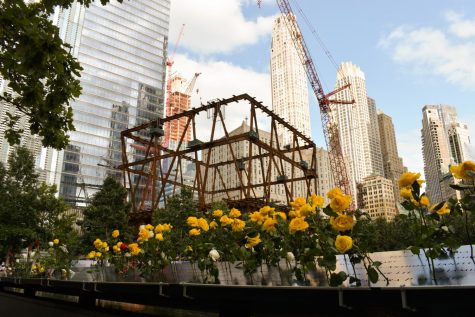
Taylor Leighton and Nathan Greess, both second-year students at NYU Law School, saw the pandemic as possibly relating to the 9/11 grieving process.
“In the context of the pandemic, and the unimaginable numbers of the pandemic, it seems like it’s easy to get disconnected from the number of people that this affected,” Greess said. “We can see One World Trade from our window … It just seemed like this was the time to come and feel the actual weight of [9/11]. I feel myself getting disconnected from the numbers related to COVID, and there’s no place where the names are written down for that; there is here, and it seems like the least we could is come down here and be here for a while.”
“Maybe [the anniversary] can serve a dual purpose here,” Leighton added. He turned five years old on September 10, 2001. He recalls the tragedy, remembers watching it on TV in his parents’ bedroom — remembers, especially, the smoke. He knew something bad had happened, but didn’t grasp the magnitude of it due to his age.
“In the last few years, especially being in New York and seeing more of the footage about 9/11 — I think when you relive and see it from an adult perspective, it’s a lot more harrowing then you would’ve ever realized growing up,” Leighton said. “Because you know about it and you pay your respects in school, when it’s 9/11, but you don’t really understand the significance. But I think when you look back and realize the significance, you see that footage, and when you’re in the city and part of the people that it has left such a huge impact on — I think you start feeling it more from a tangible perspective.”
“I think a lot of people have a more visceral reaction to stuff like [9/11], it’s much more salient, whereas the COVID stuff is so much more dispersed,” Leighton continued. “It’s so large now and we’re just in it for such a long period, I feel like people get desensitized. I think maybe another good thing that could potentially come out of coming [to the 9/11 memorial] and reminding yourself of this tragedy is not taking any death so lightly. And I think looking at the COVID numbers and realizing that these aren’t just numbers, these are people’s lives, and regardless of whether there’s names, it’s the same thing in a different circumstance.”
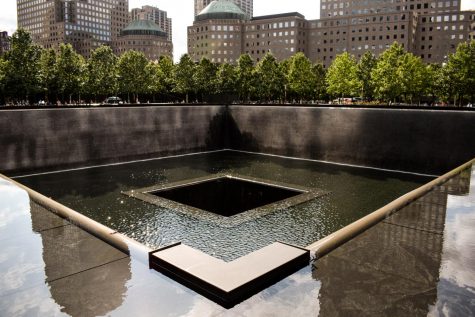
Barbara Ludwicki from Brooklyn was at the memorial with her sister, Debbie Sammut. They pared down rose stems with a knife on the stone ground; they placed the flowers on the name of Elvin Romero — their brother-in-law, the husband of their sister Diane — and on the names of Romero’s coworkers, who died on 9/11. Normally, Ludwicki meets a friend from Florida at that spot, but she couldn’t find her this year. Ludwicki believes the friend wasn’t able to come to New York due to COVID-19 travel restrictions.
Ludwicki told WSN that Elvin and Diane’s daughter, Gabi, just graduated from NYU with a master’s degree in art therapy. Gabi studied art therapy, Ludwicki said, because art therapy — drawing buildings, planes and fires — helped her through the trauma of losing her father. Now, Gabi would like to help other kids overcome their trauma.
Gabi’s brother, Alex, was two years old when their father died. He does not remember his dad.
“There are no words,” Ludwicki said of the tragedy.
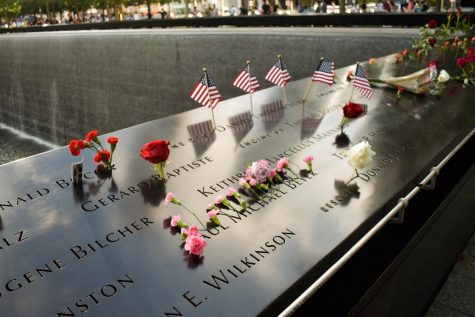
This year was the third consecutive year for Benjamin Poston Jr., from Brooklyn, to visit the memorial. His cousin, Clinton Davis Sr. was one of the police officers who died on 9/11.
“He was outside the tower, from what we were told, he was outside until he went back in to help people and that’s when he got crushed,” Poston said. “It was very horrific for our family, his wife and children, and it was a very, really tough time for my family.”
“This is my third year coming here,” Poston reiterated. “But my mom, who’s down south — a lot of the family’s dispersed now, some in Texas, some in other states — but they come here more than I do. Because sometimes I was working, or I was doing something, so I didn’t have a chance to actually come on this particular day. But when I have the chance to, I do come.”
WSN asked Poston if COVID-19 had changed the way he mourns.
“Family-wise, yes, it has, it has,” he replied. “Most of my family’s from New York. Every year, a majority of them do come up here, like his wife and his children. But because of COVID — there in a whole other state — so they can’t come up here even now. It had some damage, but it won’t stop any love. Love conquers all.”
Email Trace Miller at [email protected].























































































































































